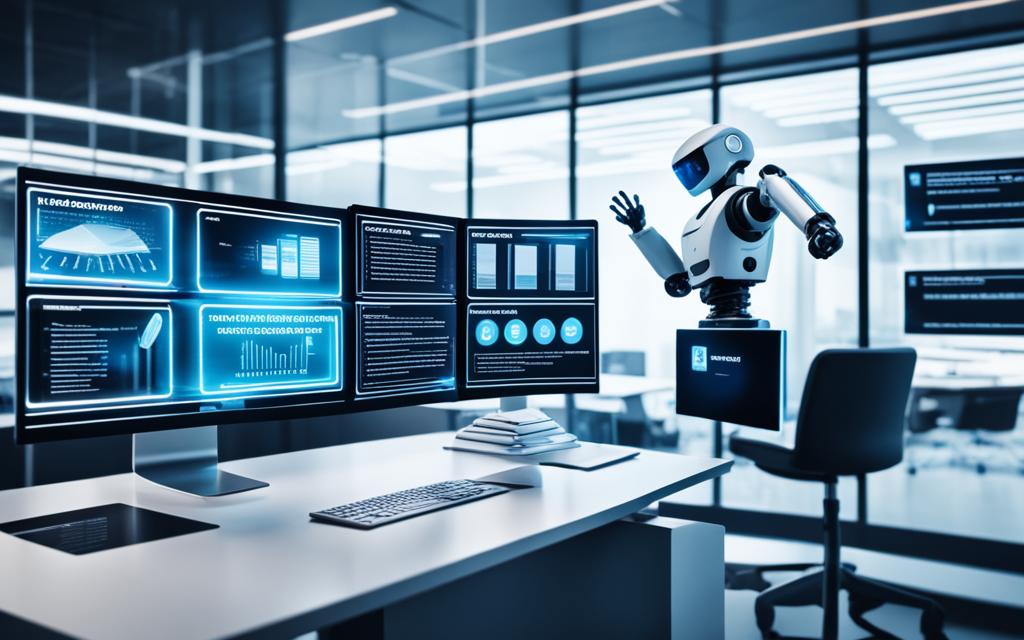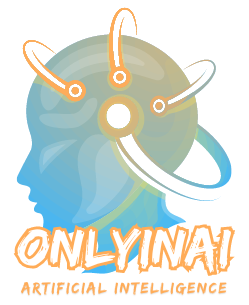A recent report by Insider lists the jobs most likely to be hit by AI tools like ChatGPT. These jobs are in tech (coders, programmers, software engineers, data analysts), media (advertising, content creation, technical writing, journalism), the legal field (paralegals, legal assistants), market research, and finance (financial analysts, personal financial advisors). AI can automate mid-career, mid-ability work, making these jobs vulnerable.
A Goldman Sachs study also found that generative AI could affect 300 million full-time jobs worldwide. This will lead to big changes in the workforce.
Key Takeaways
- AI is set to disrupt many industries and job roles, from tech to media, legal, and finance.
- Experts have pinpointed the top jobs most likely to be replaced by AI and automation.
- Jobs needing mid-level skills and cognitive tasks are especially at risk from AI-driven disruption.
- Generative AI tools like ChatGPT could lead to big changes in the workforce, affecting up to 300 million full-time jobs.
- To prepare for the AI-driven future, we need to reskill and upskill to adapt to the changing job market.
AI’s Disruption: White-Collar Jobs on the Frontline
AI is moving fast, causing big worries about its effect on jobs, especially for those with white-collar jobs. Experts say AI is heading straight for jobs that were once thought safe from automation.
A Pew Research Center expert said AI is moving up from the factory floors to the offices of high-paid workers. A 2023 Goldman Sachs report also warned that the US and Europe could lose 300 million jobs because of AI.
The Rise of Artificial Intelligence and Its Impact on the Job Market
A recent survey by ResumeBuilder showed 37% of business leaders are using AI to replace staff, and 44% expect more job cuts in 2024 because of AI. This trend is likely to keep going as AI gets better, threatening many white-collar jobs.
White-Collar Workers at Risk of Displacement
AI is affecting many white-collar jobs, from financial analysts to legal assistants. As AI gets better at tasks like data analysis and legal research, the need for human workers in these jobs might drop. This could lead to a lot of job loss.
The rise of AI automation is a big issue that needs careful thought and planning to lessen its impact on jobs. As AI keeps getting better, it’s important for workers, employers, and policymakers to work together on ways to adapt and succeed in this new world.
Coders, Programmers, and Tech Jobs in the Crosshairs
AI’s rapid growth has made many tech jobs uncertain. Roles like software developers, web developers, and data scientists might be at risk. AI tools like ChatGPT can do tasks faster than humans, making some jobs less needed.
A Brookings Institute researcher says a team of developers might now need only a few people. AI can do much of the coding. This has started a big talk about the future of work with AI automation.
AI’s Capabilities in Coding and Software Development
AI tools like ChatGPT worry some about job loss in tech. They can make code, debug, and write software, tasks once done by humans. OpenAI, ChatGPT’s maker, is thinking about using AI to replace some software engineers.
The Potential for Job Displacement in Tech Roles
Some experts think AI will help coders more than replace them. But, the risk of losing tech jobs is real. As AI gets better, it might take over tasks once done by humans. This could mean fewer tech jobs, pushing people to find new careers.
The effect of AI on tech jobs is complex and changing fast. Employers and employees must stay updated and ready for the changes AI brings.
Media and Content Creation: AI’s Writing Prowess
AI is changing the media world fast, making experts worry about its impact on jobs. Tools like ChatGPT could change jobs in advertising, technical writing, journalism, and content creation. This is because AI is getting better at reading, writing, and understanding text, which are key skills in media.
Economist Paul Krugman thinks ChatGPT might do tasks like reporting and writing better than humans. Already, the media is trying out AI-generated content. For example, tech news site CNET used an AI tool to write many articles. But, they had to correct some errors.
Even though a Brookings Institute researcher believes most content creators’ work is safe from automation, AI could still change things. As AI gets better at writing, media workers will need to learn new skills to stay ahead in an automated world.
The Rise of AI-Generated Content
The media world is used to facing new challenges, and AI-generated content is the latest one. AI tools are getting better at making text that looks like it was written by humans. This makes it hard to tell the difference.
- Tech news site CNET has already tried using AI to write many articles, but had to fix some mistakes.
- Experts say AI could change jobs in advertising, technical writing, journalism, and content creation a lot.
- Even though most content creation work might not be easily automated, AI could still shake up these industries. Media workers will need to adjust.
| Skill | AI Capabilities | Potential Impact on Jobs |
|---|---|---|
| Reading and Understanding Text | Highly Proficient | Automation of tasks like reporting, writing, and content creation |
| Writing and Composition | Rapidly Improving | Displacement of writers, journalists, and other content creators |
| Judgment and Creativity | Limited but Advancing | AI may not fully replace human-centric roles requiring creativity and nuanced decision-making |
Legal Professions: Paralegals and Legal Assistants in the Spotlight

AI technology is changing many industries, including law. A Goldman Sachs report shows AI could change legal jobs in the U.S. Paralegals and legal assistants might be most affected.
These jobs need to handle a lot of information. AI can now do some of this work. A researcher at Brookings Institute says AI is great for these jobs because it works well with structured data. This means AI could change the legal industry a lot, possibly taking some jobs from paralegals and legal assistants.
AI’s Ability to Analyze and Interpret Legal Data
AI tools are now doing tasks that paralegals and legal assistants used to do. These AI systems can quickly go through lots of legal documents. They can understand contracts, case law, and more with great accuracy. This could mean less work for paralegals and legal assistants as AI gets better.
The Potential Impact on Legal Support Roles
But AI won’t take over these jobs completely. They still need human judgment and understanding of what clients or employers need. Still, AI will make these jobs more efficient. This might mean fewer jobs for paralegals and legal assistants as AI becomes more common.
| AI Impact on Legal Industry | AI Automation of Legal Work | Paralegal and Legal Assistant Job Risk |
|---|---|---|
| Substantial impact on legal services jobs | Automation of tasks traditionally performed by paralegals and legal assistants | Potential displacement of some paralegal and legal assistant positions |
| AI systems can analyze and interpret vast amounts of legal data with speed and accuracy | Increased efficiency in legal work due to AI tools | Reduced demand for paralegal and legal assistant roles as AI automation becomes more widespread |
Top jobs most likely to get replaced by AI
AI is changing the job market fast. It’s important to know which jobs are most at risk of being automated. Some jobs might face big changes, but others could use AI to make things better. Let’s look at two jobs that might be affected by AI: market research analysts and teachers.
Market Research Analysts and AI’s Data Analysis Capabilities
Market research analysts might face challenges as AI gets better at analyzing data and predicting outcomes. AI can collect, process, and understand huge amounts of data. This could mean it might take over many tasks that analysts do now.
A researcher at Brookings Institute thinks AI could handle tasks like finding trends and planning marketing campaigns. This could change what market research analysts do.
Teachers and AI’s Potential in Education
AI is also making waves in education. Some think AI tools like ChatGPT could even teach classes. But others believe human teachers are key for teaching important skills like critical thinking and emotional intelligence.
A high school teacher pointed out that while AI might help students cheat, it can’t replace the role of teachers. Teachers are still needed to guide and support students.
The top 10 jobs at risk of AI replacement include market research analysts and teachers. These jobs show how AI’s data analysis capabilities and ChatGPT in education are changing work. As AI changes education, it’s important for everyone to adapt and find new ways to work.
Finance and Investment: AI’s Number-Crunching Capabilities
The finance world is changing fast, and AI is playing a big role. AI can look at huge amounts of data and find important insights. This is changing how financial experts do their jobs. From AI impact on finance jobs to AI-powered investment management, the financial sector is seeing big changes.
Financial Analysts and Personal Advisors at Risk
Financial analysts and personal financial advisors might see their jobs change because of AI. They do tasks like automated financial analysis, spot market trends, and suggest investment plans. AI can do these tasks fast and well, which might mean less need for people in some areas.
Traders and AI’s Impact on Wall Street
AI is also changing the trading world. AI in investment and trading is changing how investment choices are made. AI trading algorithms can look at market data, find patterns, and make trades fast and well. This change is expected to greatly affect traditional Wall Street jobs, as AI-driven strategies become more common.
Even though AI might take over some finance and investment jobs, it won’t replace all of them. Human judgment, decision-making, and strategic planning are still key. AI will just automate some tasks and functions.
Creative Professions: AI’s Artistic Abilities
Experts say AI could threaten jobs in creative fields, even though some think it won’t. AI can now make high-quality art, videos, and designs, which might change jobs in these areas. But, a Brookings Institute researcher believes most content creators’ work is safe from automation. It needs too much human judgment. Still, AI could make creative tasks faster and better, worrying those in graphic design, art, and video editing.
AI’s Potential to Generate Art, Videos, and Designs
AI has made big strides in content creation, making art, videos, and designs quickly and accurately. These tools can mimic human style and look, which could hurt traditional creative jobs. AI is now tackling tasks once done only by skilled artists and designers.
The Threat to Creative Professionals
- Graphic designers: AI can make designs, layouts, and illustrations that look good, possibly taking over some human designer tasks.
- Artists: AI can create art that’s as good as what humans make, challenging the role of artists.
- Video editors: AI tools can cut, splice, and improve videos, making skilled video editors less needed.
Most creative work still needs a human touch, but AI is making content creation tools better. This change is worrying for creative workers. As AI gets better, creatives must learn new skills to keep up in the job market.
Reskilling and Upskilling: Preparing for the AI-Driven Future

The threat of reskilling for AI-driven jobs is real. Workers need to get ready by learning new skills. With adapting to automation happening fast, it’s key to have a plan for career transition strategies.
Start by looking into new career paths that fit your interests and skills. Find jobs that AI won’t easily take over, where your skills stand out. It’s important to keep learning and getting new skills. Many online platforms offer courses and training to help you learn what’s in demand.
Also, aim to be the best at what you do. Create a personal brand and expertise that no one else has. Even as AI takes over some tasks, human skills and knowledge will still be needed.
- Explore reskilling for AI-driven jobs to adapt to changing industry demands.
- Invest in upskilling to stay competitive by pursuing relevant training and certifications.
- Develop strategies to adapt to automation and identify roles less prone to displacement.
- Leverage career transition strategies to position yourself for success in the AI-driven future.
To succeed in the AI-driven future, embrace reskilling and upskilling. By staying ahead and always learning new things, you can ensure your success in the changing job market.
Artificial intelligence is changing the job market fast.
It’s making a big impact on white-collar jobs like tech, law, and finance. Tools like ChatGPT can do many tasks that humans used to do. This makes people worry about losing their jobs and the future of work.
But not all jobs will be taken over by AI. Jobs that need human judgment, emotional smarts, and social skills will likely stay safe. Workers need to keep learning new skills and getting better at what they do. This will help them stay ahead in a world with more AI.
The future will be about working together with AI. Those who know how to use AI tools well will have an advantage. By using this new technology, we can overcome challenges and make sure the workforce is strong and ready for the AI economy.


